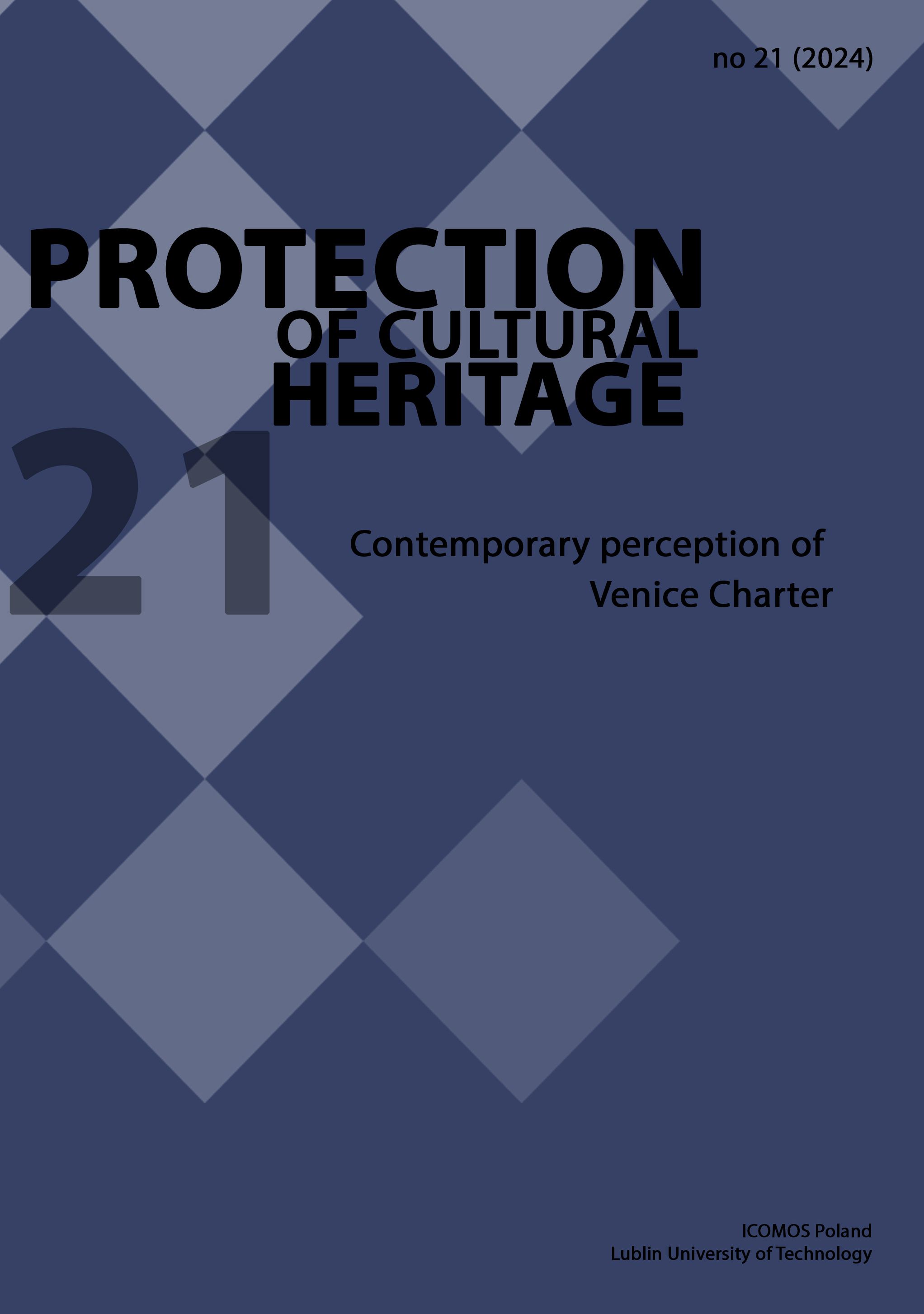Beyond Monuments: Rethinking Heritage Through the Mundane and the Ephemeral in Tokyo
Article Sidebar
Issue No. 21 (2024)
-
The relevance of the Venice Charter today
Stefano Gizzi1-10
-
Venice Charter and its role in shaping concepts in the heritage protection system
Siwek Andrzej11-22
-
Charter of Historic Cultural Landscapes (CHCL) – proposal
Irena Niedźwiecka-Filipiak, Dorota Sikora, Łukasz Woźniak, Alicja Woźniak23-50
-
Andrzej Tomaszewski's "Pluralistic conservation philosophy" as a challenge: Do we have a problem with European identity?
Janusz Krawczyk51-61
-
Beyond Monuments: Rethinking Heritage Through the Mundane and the Ephemeral in Tokyo
Tamas Solymosi63-76
-
Venice Charter and the Development of Authenticity
Shirley Cefai77-101
-
On the necessity of symbolic interventions in dissonant monuments
Philipp Oswalt103-112
Main Article Content
DOI
Authors
Abstract
As global cities rapidly evolve, conventional approaches to architectural heritage conservation struggle to address the complexities of contemporary urban landscapes. This paper critically examines the limitations of the Venice Charter's monument-centric principles in recognizing the cultural significance of vernacular architecture, ephemeral spaces, and community narratives that shape the lived experiences of Tokyo's residents. Grounded in critical heritage theory and ethnographic research, it proposes an alternative set of principles that acknowledge the inherent value of the mundane, the utilitarian, and the ephemeral aspects of the built environment.
Case studies, including the Yanesen neighborhood's grassroots preservation efforts and Studio Gross's PARK-PLATZ placemaking intervention, illustrate the principles in action. While acknowledging the Venice Charter's historical relevance for exceptional monuments, the paper calls for an expanded, community-centric paradigm that resonates with Tokyo's ever-evolving urban fabric.
By advocating for inclusive frameworks that value the dynamic interplay between residents and their surroundings, this study offers a nuanced critique of traditional top-down conservation models. It highlights the urgency of developing responsive strategies that honour the multivalent realities and lived heritage embodied in the intricate tapestries of contemporary cities.
Keywords:
References
Almazán, J., & Studiolab. (2022). Emergent Tokyo: Designing the Spontaneous City. Oro Editions.
Brumann, C., & Schulz, E. (Eds.). (2015). Urban Spaces in Japan: Cultural and Social Perspectives. London: Routledge.
Gibert-Flutre, M., & Imai, H. (2020). Asian Alleyways: An Urban Vernacular in Times of Globalization. Amsterdam University Press. https://doi.org/10.5117/9789463729604 DOI: https://doi.org/10.5117/9789463729604_intro
Hosei University Research Center for Edo-Tokyo Studies, Department of Architecture, Faculty of Engineering and Design, Hosei University, SCI-Arc, Politecnico di Torino (2019): Edo-Tokyo, Challenging the Urban Fabric Ueno Hongo Yanaka Nezu Shitaya. Shokokusha Publishing.
Houbart, C. (2014). Deconsecrating a Doctrinal Monument: Raymond M. Lemaire (1921–1997) and the Revisions of the Venice Charter. Change Over Time, 4(2), 218-243. https://doi.org/10.1353/cot.2014.0019. DOI: https://doi.org/10.1353/cot.2014.0019
Imai, H. (2017). Tokyo Roji: The Diversity and Versatility of Alleys in a City in Transition (1st ed.). Routledge. https://doi.org/10.4324/9781315669281 DOI: https://doi.org/10.4324/9781315669281-1
Jokilehto, J. (2015). What is modern conservation? Some thoughts about the evolution of modern conservation policies. Conversaciones con., (1), 29–38. Recuperado a partir de https://revistas.inah.gob.mx/index.php/conversaciones/article/view/10875
Jokilehto, J. (2021). Observations on Concepts in the Venice Charter. Conversaciones…, (11), 353-363. [fecha de Consulta 18 de Marzo de 2024]. ISSN: 2594-0813. Disponible http://portal.amelica.org/ameli/journal/317/3173864024/
Kaijima, M., Kuroda, J., & Tsukamoto, Y. (2010). Made In Tokyo. Kajima Institute Publishing.
Kaijima, M., Stalder, L., & Iseki, Y. (2018). Architectural Ethnography. TOTO Publishing.
Kitayama, K., Tsukamoto, Y., & Nishizawa, R. (2010). Tokyo Metabolizing. TOTO Publishing.
Lipp, W. (2024): 60 Years and not a Big Quiet: Reflections on the history of time and ideas for an anniversary. [Unpublished manuscript].
Maki, F. (2008). Nurturing Dreams: Collected Essays on Architecture and the City. The MIT Press. DOI: https://doi.org/10.7551/mitpress/7596.001.0001
Muminović, M., Radović, D. & Almazán, J., (2013). On Innovative Practices Which Contribute to Preservation of the Place Identity: The Example of Yanesen, Tokyo. Journal of Civil Engineering and Architecture, 7(3). https://doi.org/10.17265/1934-7359/2013.03.009 DOI: https://doi.org/10.17265/1934-7359/2013.03.009
Radović, D, & Boontharm, D. (eds.) (2012): Measuring the Non-Measurable 01: Small Tokyo. flick studio.
Rojas, E. (2014). Historic Cities and the Venice Charter: Contributions to the Sustainable Preservation of Urban Heritage. Change Over Time, 4(2), 196–203. https://doi.org/10.1353/cot.2014.0013 DOI: https://doi.org/10.1353/cot.2014.0013
Sand, J. (2013). Tokyo Vernacular: Common Spaces, Local Histories, Found Objects. Berkeley: University of California Press. DOI: https://doi.org/10.1525/california/9780520275669.001.0001
Salemink, O. (2021). Introduction: Heritagizing Asian cities: space, memory, and vernacular heritage practices. International Journal of Heritage Studies, 27:8, 769-776. https://doi.org/10.1080/13527258.2021.1890186 DOI: https://doi.org/10.1080/13527258.2021.1890186
Sorensen, A. (2009). Neighborhood Streets as Meaningful Spaces: Claiming Rights to Shared Spaces in Tokyo. City & Society, 21(2), 207–229. https://doi.org/10.1111/j.1548-744X.2009.01022.x DOI: https://doi.org/10.1111/j.1548-744X.2009.01022.x
Suzuki, R. (2012): The Experience of Architecture. In Takeuchi, M (ed.) (2018): Silence and Image. Akaaka-sha. 102-104.
Article Details
Abstract views: 282







